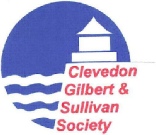
This is an attempt to describe the origins of the Clevedon G&S Society in 1972 and its development until 1985 by someone who was involved both in the public eye and behind the scenes. As there is no definitive historical record this account will almost inevitably omit some events or people who were part of the story and it is hoped this will not cause offence. It is also hoped that anyone who has relevant information will contact the Web Site or a member of the committee and help to create a fuller picture.
In 1971 Doris Ellis, a teacher at Clevedon Comprehensive School was sitting in the staff room talking to another teacher, Ron Tripp. Ron was the conductor of the Clevedon Choral Society and was well known in the town for his musical talents. He told Doris that he was keen to perform a G&S opera at the school but needed help to do so. She suggested that he should talk with her husband, Harry, who had been involved with G&S in Bristol, and in Hastings before they moved to this area and had in the recent years played non-G&S roles with the Clevedon Light Opera Club.
Ron and Harry talked and Ron suggested performing Trial by Jury as the second part of a School Concert, with Ron being Musical Director and Harry the Producer and playing The Judge. Several of the school staff gave enthusiastic support and the cast and the necessary back-stage and front-of- house helpers came from teaching and non-teaching staff, pupils, parents and close friends of the school. The event was an outstanding success. During rehearsals there emerged a strong desire to continue with the activity and it was suggested formalizing the group as a sub-group of the Clevedon School Association with most participants having close links with the school. The aim was to produce an annual G&S opera at the school. Although Clevedon Light Opera Club had produced some G&S operas between 1950 and 1956, their committee had not wished to produce any since that time and seemed unlikely to change their mind, so it was felt that a group dedicated to G&S was not in direct conflict, and the sub-group was established. The first full production was H.M.S. Pinafore. It performed to over 1000 people and had the pleasure of ‘House Full’ notices on two nights.
The school participated fully and the arrangements had the very active support of the Headmaster, Bill Body, who had a strong belief in the development of School and Community relations. For the first few years there was no committee and many of the productions had Ron Tripp as Musical Director and Harry Ellis as Producer. They took decisions after consultation with some very active school staff who participated in the productions, including Beryl Lawton and Doris Ellis, performing and doing much organization back-stage, Diana Holl with husband, Peter, helping behind the scenes, Morris Cotton performing and Musically Directing, Roy Lewis providing the lighting, John Williams and Allan Davis Stage-Managing, Jo Perry providing costumes and Annette Lewis, Valerie Ingram, Carol Evans, Billy Wilcox, Doreen Williams, John Butler and John Wilson performing. The pupils and staff of the Wood and Metalwork department helped with construction and those of the Art department painted the scenery. Pupils performed on stage, helped with the lighting and sold programmes. Parents and other friends of the school joined from the early days and performed on stage. Notable among those were Yvonne and Mark Ayres, Vernon Weeds, Clarine Coombes, Vivienne Norris, Jean Fowler, Bert Figures, John Yeoman and Cyril Purnell. Anne Pring and Viv May have stayed with the Society and performed continually since the early days and Anne Pring is in the current (2011) production of “Gondoliers”.
After a few years it was decided to form a committee and in the early years Mark Ayres, Ron Tripp, Harry Ellis and Annette Lewis all served as Chairpersons of the group, and Carol Evans was the Secretary. In 1984 the club decided to award Life Membership to Mark Ayres, Beryl Lawton, Doris Ellis, Harry Ellis and Ron Tripp in recognition of their contributions in founding the Society and developing it up to that date. Inevitably illness death and changes of life-style meant the loss of some participants but new members joined and some members changed roles. Between the start and 1985 some of the changes for people who are well-known locally involved Valerie Ingram who became a Musical Director and Gordon Lawrence who was in the cast for Trial by Jury but after that show had a gap and rejoined the group in 2002 to play a very active part in the Society’s life since then. Paul Carroll joined the chorus as a pupil in 1973, became an assistant producer to Harry Ellis and later a Producer. Jane Dean joined the chorus as a pupil in 1981, progressed rapidly to leading roles and, as Jane Gilchrist, has achieved singing fame outside the Society. David Dean joined in 1978 to play Pooh Bah and has played many roles since then. Roger Carroll joined the Society in 1984, played Jack Point and has played a very active part in the Society since then and up to the present. Liz Holmes (now Proctor) joined the chorus while a pupil in 1982 and then took leading roles. Jane Pritchard (now Bull) joined the chorus as a pupil in 1977, painted scenery and undertook choreography. Adrian Johnston-Hubold joined the school staff and in 1982 played the Major General and Joyce Lockstone and Mike Luker came in to play leading roles. Bev Ayres (now Chapman) moved from programme seller in 1973 to chorus member and leading role performer, while Rowena Ayres did the same, and also became a Producer. These two are proud of the fact that there has been a member o the Ayres’ family in every production from H.M.S. Pinafore to the present one (2011). Ron Tripp became seriously ill, unfortunately remains so, and had to stop all activity of this kind. Harry Ellis became seriously ill in 1983 and had to retire from work. Because if the illness and change of life-style he and Doris stopped working with the club after the 1985 production but rejoined in 2005 and in this production (2011) Harry is Don Alhambra and Doris is helping behind the scenes.
This account, with the 40th anniversary upon us, has focused on the start to 1985 (with reference to the current (2011) production), but the Society has changed, developed and flourished since then with many new-comers and many established members taking on very active roles and positions. It is hoped to bring the account up to date and make corrections and additions to this early account.
In 1971 Doris Ellis, a teacher at Clevedon Comprehensive School was sitting in the staff room talking to another teacher, Ron Tripp. Ron was the conductor of the Clevedon Choral Society and was well known in the town for his musical talents. He told Doris that he was keen to perform a G&S opera at the school but needed help to do so. She suggested that he should talk with her husband, Harry, who had been involved with G&S in Bristol, and in Hastings before they moved to this area and had in the recent years played non-G&S roles with the Clevedon Light Opera Club.
Ron and Harry talked and Ron suggested performing Trial by Jury as the second part of a School Concert, with Ron being Musical Director and Harry the Producer and playing The Judge. Several of the school staff gave enthusiastic support and the cast and the necessary back-stage and front-of- house helpers came from teaching and non-teaching staff, pupils, parents and close friends of the school. The event was an outstanding success. During rehearsals there emerged a strong desire to continue with the activity and it was suggested formalizing the group as a sub-group of the Clevedon School Association with most participants having close links with the school. The aim was to produce an annual G&S opera at the school. Although Clevedon Light Opera Club had produced some G&S operas between 1950 and 1956, their committee had not wished to produce any since that time and seemed unlikely to change their mind, so it was felt that a group dedicated to G&S was not in direct conflict, and the sub-group was established. The first full production was H.M.S. Pinafore. It performed to over 1000 people and had the pleasure of ‘House Full’ notices on two nights.
The school participated fully and the arrangements had the very active support of the Headmaster, Bill Body, who had a strong belief in the development of School and Community relations. For the first few years there was no committee and many of the productions had Ron Tripp as Musical Director and Harry Ellis as Producer. They took decisions after consultation with some very active school staff who participated in the productions, including Beryl Lawton and Doris Ellis, performing and doing much organization back-stage, Diana Holl with husband, Peter, helping behind the scenes, Morris Cotton performing and Musically Directing, Roy Lewis providing the lighting, John Williams and Allan Davis Stage-Managing, Jo Perry providing costumes and Annette Lewis, Valerie Ingram, Carol Evans, Billy Wilcox, Doreen Williams, John Butler and John Wilson performing. The pupils and staff of the Wood and Metalwork department helped with construction and those of the Art department painted the scenery. Pupils performed on stage, helped with the lighting and sold programmes. Parents and other friends of the school joined from the early days and performed on stage. Notable among those were Yvonne and Mark Ayres, Vernon Weeds, Clarine Coombes, Vivienne Norris, Jean Fowler, Bert Figures, John Yeoman and Cyril Purnell. Anne Pring and Viv May have stayed with the Society and performed continually since the early days and Anne Pring is in the current (2011) production of “Gondoliers”.
After a few years it was decided to form a committee and in the early years Mark Ayres, Ron Tripp, Harry Ellis and Annette Lewis all served as Chairpersons of the group, and Carol Evans was the Secretary. In 1984 the club decided to award Life Membership to Mark Ayres, Beryl Lawton, Doris Ellis, Harry Ellis and Ron Tripp in recognition of their contributions in founding the Society and developing it up to that date. Inevitably illness death and changes of life-style meant the loss of some participants but new members joined and some members changed roles. Between the start and 1985 some of the changes for people who are well-known locally involved Valerie Ingram who became a Musical Director and Gordon Lawrence who was in the cast for Trial by Jury but after that show had a gap and rejoined the group in 2002 to play a very active part in the Society’s life since then. Paul Carroll joined the chorus as a pupil in 1973, became an assistant producer to Harry Ellis and later a Producer. Jane Dean joined the chorus as a pupil in 1981, progressed rapidly to leading roles and, as Jane Gilchrist, has achieved singing fame outside the Society. David Dean joined in 1978 to play Pooh Bah and has played many roles since then. Roger Carroll joined the Society in 1984, played Jack Point and has played a very active part in the Society since then and up to the present. Liz Holmes (now Proctor) joined the chorus while a pupil in 1982 and then took leading roles. Jane Pritchard (now Bull) joined the chorus as a pupil in 1977, painted scenery and undertook choreography. Adrian Johnston-Hubold joined the school staff and in 1982 played the Major General and Joyce Lockstone and Mike Luker came in to play leading roles. Bev Ayres (now Chapman) moved from programme seller in 1973 to chorus member and leading role performer, while Rowena Ayres did the same, and also became a Producer. These two are proud of the fact that there has been a member o the Ayres’ family in every production from H.M.S. Pinafore to the present one (2011). Ron Tripp became seriously ill, unfortunately remains so, and had to stop all activity of this kind. Harry Ellis became seriously ill in 1983 and had to retire from work. Because if the illness and change of life-style he and Doris stopped working with the club after the 1985 production but rejoined in 2005 and in this production (2011) Harry is Don Alhambra and Doris is helping behind the scenes.
This account, with the 40th anniversary upon us, has focused on the start to 1985 (with reference to the current (2011) production), but the Society has changed, developed and flourished since then with many new-comers and many established members taking on very active roles and positions. It is hoped to bring the account up to date and make corrections and additions to this early account.
Clevedon G&S Society
The Origin and Early Years
The Origin and Early Years
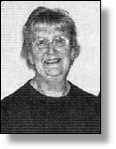
Doris Ellis
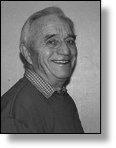
Harry Ellis
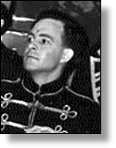
Ron Tripp
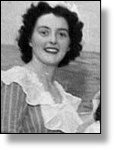
Beryl Lawton
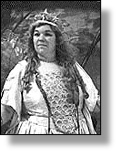
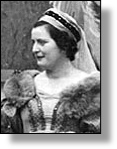
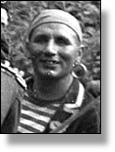
Yvonne Ayres
Mark Ayres
Clarine
Coombes
Coombes
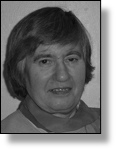
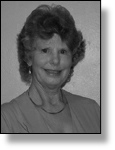
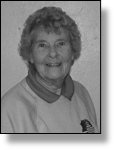
Jean Fowler
Viv May
Anne Pring
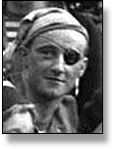
Gordon
Lawrence
Lawrence
Continuation of History of G&S Society, written in 2002
Between 40 and 50 people took part in the shows at the school in the early years accompanied by an orchestra of about 20. By 1994 the number on stage had only dropped very slightly to about 40. It is difficult to imagine how we managed to accommodate so many on what is a relatively small stage.
The Society continued to put on annual performances at the school until 1994 when members decided it was time to break the link s with the school and move the performances to the Princes Theatre at the Community Association.
The Society had already changed its rehearsal venue to St. Peter’s Hall in Alexandra Road by this time and it had become obvious that there was less support for the Society, both from within the School and within the School Association which prompted the move. Also there were better facilities at the Community Centre and the Gym and Gym changing rooms at the School could be bitterly cold in February.
During the period at the School the Society made gifts to the Arts Faculty in lieu of charges and had helped to maintain stage assets such as scenery and lighting.
The Society has competed in local Gilbert and Sullivan competitions, has received nominations for Rose Bowl awards and, in that competition our leading lady won ‘The Most Outstanding Musical Performer’ award for her performance in Ruddigore.
The Society changed its name to Clevedon Gilbert and Sullivan Society when it cut its links with the School. The first performance at the Princes theatre in February 1995 was Iolanthe.
The last years at the School and the first couple at the Princes Theatre proved to be financially difficult for the Society but, due to prudent budgeting and control, the Society gained a firm footing. Coupled with this has been a growth in the audiences who are, no doubt, enjoying the innovative productions which still remain true to the music of Sullivan and the lyrics of Gilbert. The inclusion of additional dialogue relating to current or local issues and to recent events, in true Gilbertian style, has added interest to the productions.
For example we have used a small tracked JCB digger in The Mikado in 1998 and Teletubbies lookalikes and a talking head in Ruddigore in 1999. Our 2000 production of H.M.S Pinafore was done with Trial by Jury becoming an Act 3 Court Martial with an Italian jilted bride, Italian bridesmaids and a Counsel called Pavagrotti. In The Sorcerer in 2001 there were take-offs of “Who wants to be a Millionaire” and “The Weakest Link” as well as a magic show with a little Pokémon.
The Society has always been pleased to put on concerts during the summer months for the benefit of charities and for fund-raising events. In February 2000 it held its first Gala Night at the Princes Theatre, including a performance of The Zoo which proved to be a great success.
It has been the Society’s aim to support activities in the Town. This we normally do in appropriate costume of the Gilbert and Sullivan era. We were proud to be invited to sing at the end of the Pier as the crowd came down to board The Waverley paddle steamer at the grand re-opening on 23 May 1998 and, on the same day supported the traders in Hill Road with a concert in the afternoon. On this occasion we managed to pull such a large audience that they spilled into the road and it remained closed until the Police eventually arrived to clear it. The Society also performed on the seafront at the unveiling of the Millennium plaque.
In October 2001 the Society gave two performance of Dick Deadeye to the Rescue, a show which was loosely based on a 1970’s cartoon in which Dick Deadeye goes in search of the ultimate secret and on the way meets a host of characters from the G&S operas. The show, which contains a large number of well-known G&S songs and choruses, was well received and over 100 pounds was raised for the Clevedon Lions annual appeal.
The Society’s 30th anniversary performance was The Gondoliers which was attended by some 700 people over the four nights, including the Civic party on the Friday night. The show was most successful financially with gross ticket sales of just over £4000 and artistically lived up to the high reputation of the Society’ productions.
The Society continued to put on annual performances at the school until 1994 when members decided it was time to break the link s with the school and move the performances to the Princes Theatre at the Community Association.
The Society had already changed its rehearsal venue to St. Peter’s Hall in Alexandra Road by this time and it had become obvious that there was less support for the Society, both from within the School and within the School Association which prompted the move. Also there were better facilities at the Community Centre and the Gym and Gym changing rooms at the School could be bitterly cold in February.
During the period at the School the Society made gifts to the Arts Faculty in lieu of charges and had helped to maintain stage assets such as scenery and lighting.
The Society has competed in local Gilbert and Sullivan competitions, has received nominations for Rose Bowl awards and, in that competition our leading lady won ‘The Most Outstanding Musical Performer’ award for her performance in Ruddigore.
The Society changed its name to Clevedon Gilbert and Sullivan Society when it cut its links with the School. The first performance at the Princes theatre in February 1995 was Iolanthe.
The last years at the School and the first couple at the Princes Theatre proved to be financially difficult for the Society but, due to prudent budgeting and control, the Society gained a firm footing. Coupled with this has been a growth in the audiences who are, no doubt, enjoying the innovative productions which still remain true to the music of Sullivan and the lyrics of Gilbert. The inclusion of additional dialogue relating to current or local issues and to recent events, in true Gilbertian style, has added interest to the productions.
For example we have used a small tracked JCB digger in The Mikado in 1998 and Teletubbies lookalikes and a talking head in Ruddigore in 1999. Our 2000 production of H.M.S Pinafore was done with Trial by Jury becoming an Act 3 Court Martial with an Italian jilted bride, Italian bridesmaids and a Counsel called Pavagrotti. In The Sorcerer in 2001 there were take-offs of “Who wants to be a Millionaire” and “The Weakest Link” as well as a magic show with a little Pokémon.
The Society has always been pleased to put on concerts during the summer months for the benefit of charities and for fund-raising events. In February 2000 it held its first Gala Night at the Princes Theatre, including a performance of The Zoo which proved to be a great success.
It has been the Society’s aim to support activities in the Town. This we normally do in appropriate costume of the Gilbert and Sullivan era. We were proud to be invited to sing at the end of the Pier as the crowd came down to board The Waverley paddle steamer at the grand re-opening on 23 May 1998 and, on the same day supported the traders in Hill Road with a concert in the afternoon. On this occasion we managed to pull such a large audience that they spilled into the road and it remained closed until the Police eventually arrived to clear it. The Society also performed on the seafront at the unveiling of the Millennium plaque.
In October 2001 the Society gave two performance of Dick Deadeye to the Rescue, a show which was loosely based on a 1970’s cartoon in which Dick Deadeye goes in search of the ultimate secret and on the way meets a host of characters from the G&S operas. The show, which contains a large number of well-known G&S songs and choruses, was well received and over 100 pounds was raised for the Clevedon Lions annual appeal.
The Society’s 30th anniversary performance was The Gondoliers which was attended by some 700 people over the four nights, including the Civic party on the Friday night. The show was most successful financially with gross ticket sales of just over £4000 and artistically lived up to the high reputation of the Society’ productions.
| 2010 to 2019 |
| 2000 to 2009 |
| 1990 to 1999 |
| 1980 to 1989 |
| 1972 to 1979 |
| 2010 Ruddigore |
| 2011 The Gondoliers |
| 2012 The Sorcerer |
| 2013 Iolanthe |
| 2014 The Pirates of Penzance |
| 2015 The Yeomen of the Guard |
| 2016 The Mikado |
| 2017 HMS Pinafore |
| 2018 Patience |
| 2019 The Gondoliers |
| 2000 HMS Pinafore |
| 2001 The Sorcerer |
| 2002 The Gondoliers |
| 2003 Yeomen of the Guard |
| 2004 Iolanthe |
| 2005 Princess Ida |
| 2006 Pirates of Penzance |
| 2007 Mikado |
| 2008 Patience |
| 2009 HMS Pinafore |
| 1990 Pirates of Penzance |
| 1991 Princess Ida |
| 1992 The Gondoliers |
| 1993 HMS Pinafore |
| 1994 Yeomen of the Guard |
| 1995 Iolanthe |
| 1996 The Pirates of Penzance |
| 1997 Patience |
| 1998 The Mikado |
| 1999 Ruddigore |
| 1980 H.M.S Pinafore |
| 1981 Ruddigore |
| 1982 The Pirates of Penzance |
| 1983 The Gondoliers |
| 1984 Patience |
| 1985 Yeomen of the Guard |
| 1986 Iolanthe |
| 1987 The Sorcerer |
| 1988 The Mikado |
| 1989 Ruddigore |
| 1972 Trial by Jury |
| 1973 HMS Pinafore |
| 1974 Iolanthe |
| 1975 The Gondoliers |
| 1976 The Pirates of Penzance |
| 1977 The Yeomen of the Guard |
| 1978 The Mikado |
| 1979 Princess Ida |
| Current Hall of Fame |
| Past Hall of Fame |